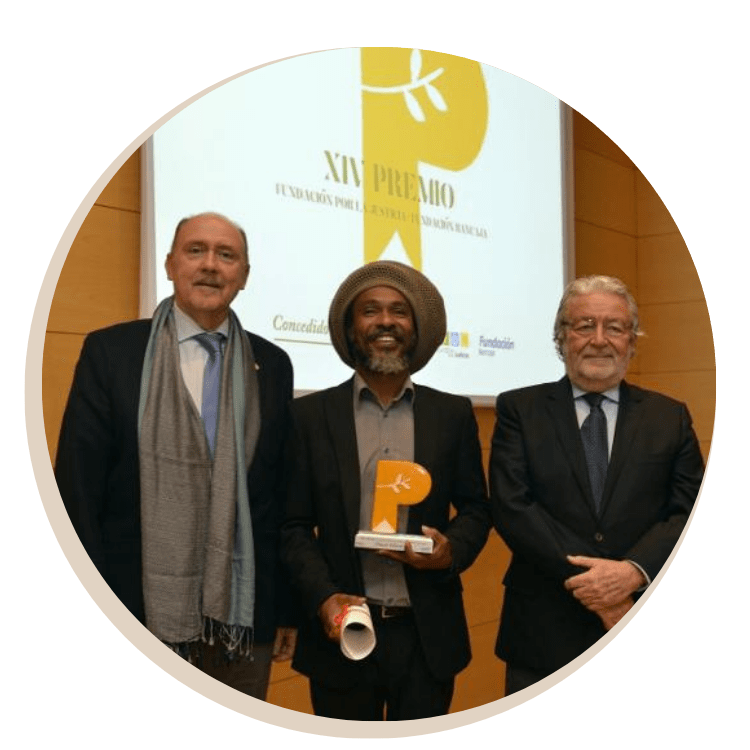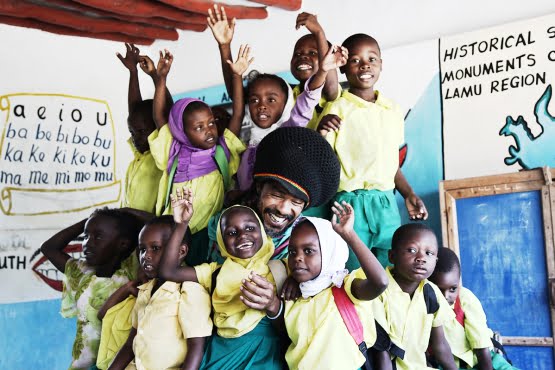 The president of the Foundation for Justice, José María Tomás y Tío and the president of the Bancaja Foundation, Rafael Alcón, presented yesterday the XIV Foundation for Justice-Bancaja Foundation Award to the social entrepreneur and international musician Omar Islam Ali for his work in defense of the rights of the population of the island of Lamu (Kenya) and for the founding of the Twashukuru Academy School children's school, which gives coverture to 46 boys and girls of this region in a situation of extreme poverty and which is supported from Spain by the One Day Yes association.
The president of the Foundation for Justice, José María Tomás y Tío and the president of the Bancaja Foundation, Rafael Alcón, presented yesterday the XIV Foundation for Justice-Bancaja Foundation Award to the social entrepreneur and international musician Omar Islam Ali for his work in defense of the rights of the population of the island of Lamu (Kenya) and for the founding of the Twashukuru Academy School children's school, which gives coverture to 46 boys and girls of this region in a situation of extreme poverty and which is supported from Spain by the One Day Yes association.
The award has a financial award of 8,000 euros, which will allow us to finish building a classroom and complete the construction of the center, in addition to better managing the educational levels of the students.
Omar Islam Ali, (Lamu, Kenya) left his native island when he was 20 years old looking for a better future to help his family. He traveled to the United States, where he lived for another 20 years until He returned to his place of origin with a clear objective: to return to his community everything he had achieved abroad.. Upon his return he discovered a serious environmental problem: the arrival of plastic to the island in the 90s and the absence of waste management plans, which caused pollution and dirt. The education acquired by Omar in the United States allowed him educate about the use of this material and teach women from the community in a situation of exclusion to convert plastic into recycled craft products that they could sell and thus allow them to improve their quality of life. These women went to work accompanied by their children and that was the beginning of the project to create the school: a space to provide educational and food coverage to the little ones and thus promote a future for new generations in Lamu with better possibilities.
 Twashukuru Nursery School
Twashukuru Nursery School
The Jury of the XIV Foundation for Justice Award – Bancaja Foundation has been chaired by Julián Ríos, winner in the previous edition, and made up of: Enric Morera, president of the Corts Valencianes; Manuel Mata, ombudsman of the socialist group in Les Corts Valencianes; José Mª Tomás y Tío, president of the Foundation for Justice; Rafael Alcón, president of the Bancaja Foundation; María Iborra, patron of the Foundation for Justice; Alejandro Mañes, patron of the Foundation for Justice; Rosa Colomer, patron of the Maides Foundation; Francisco Almenar, vice president of the Valencia Water Court; José María Segura, director of SJM representing the Jesuit Refugee Service; and Salvador Alborch, patron of Fundación por la Justicia, as secretary of the Jury.
Awarded for the first time in 1995 to Adolfo Suárez, this award has been awarded in successive editions to people and entities such as the Tribunal de las Aguas de la Vega of Valencia, the Association of Victims of Terrorism, the Association for the Search of Boys and Girls Disappeared (El Salvador), Professor Muhammad Yunus (Bangladesh), Mrs. Bogaletch Gebre (Ethiopia), Father Vicente Berenguer (Mozambique), Dr. Pedro Cavadas (Valencia), Missionaries of Charity (India), the Jesuit Service to Refugees (Rome), MAIDES Foundation (Valencia), Richard Frechette, director of Our Little Brothers in Haiti and criminal lawyer Julián Carlos Ríos Martín, the last winner for his intense work defending the rights of prisoners and his efforts in reform of penitentiary and prison laws as a response to provide justice to crime.
